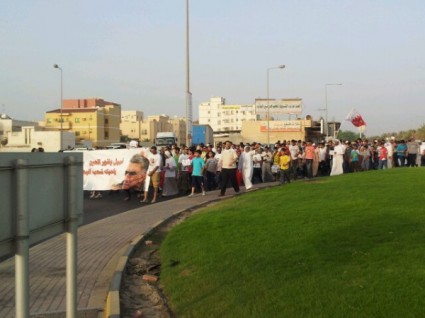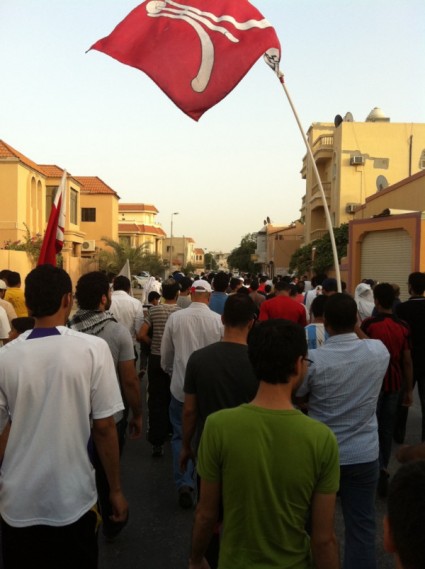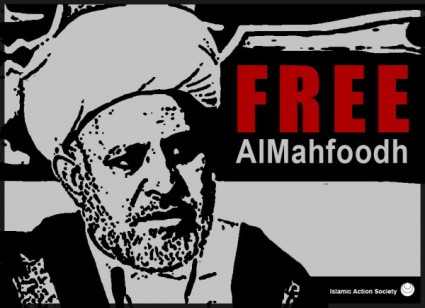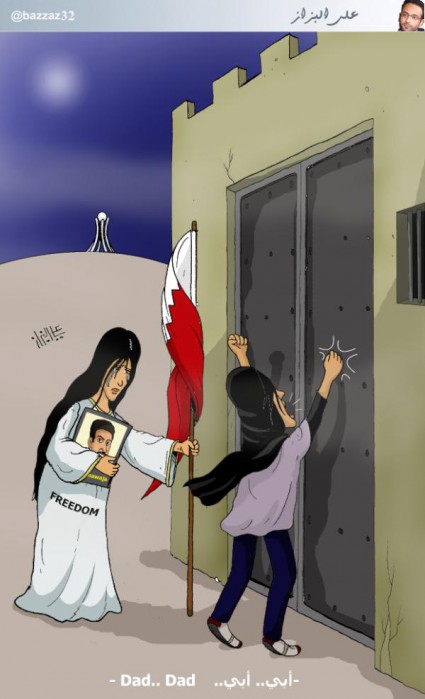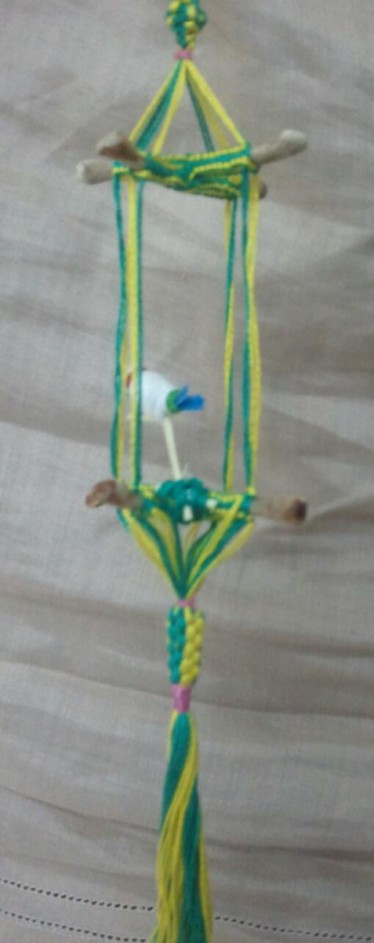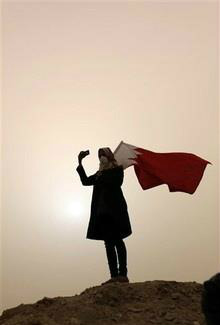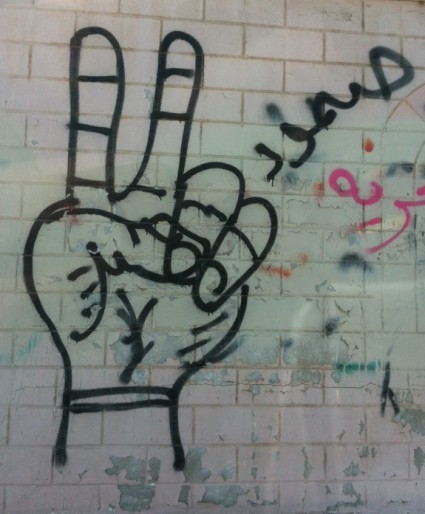“We are going to carry on protesting …” says Zainab Alkhawaja, “It doesn’t matter if we get arrested five, six, 10 times…”
Nabell Rajab, the president of the Bahrain Center for Human Rights, was released on bail after being held for nearly a month. “We always thought that America and Bahrain’s good relations would benefit our fight for freedom and democracy in our region, but it has turned out to be opposite,” he says. “They are supporting a dictator here, the oppressive regime… We have to suffer for being a rich region.”
Alkhawaja, who was jailed in April after protesting the detention of her father, Abdulhadi, vows: “We are going to carry on protesting … It doesn’t matter if we get arrested five, six, 10 times, it’s not going to stop. In the end, we have sacrificed a lot for democracy and freedom.”
June 1, 2012 No Comments
As Bahrain pro-democracy seekers pursue freedom and justice, regime shamefully calls illegally detained “terroists”
Bahrain: Pro-democracy Demonstrators are Facing Charges Related to Terrorism
May 31st, 2012 – Bahrain Youth Society for Human Rights
The Bahrain Youth Society for Human Rights (BYSHR) expresses its deep concern regarding use of the law no. 58 for 2006 related to the protection of society against terrorist acts against pro-democracy demonstrators who were arrested during the past weeks.
According to information of BYSHR, more than 30 pro-democracy demonstrators to be held in custody for 60 days pending investigation.
Penal Code: Held in custody for pending investigation must not exceed 45 days.
Punishments in the law of Terrorist “harsh” may reach Death Penalty or Life Imprisonment.
On 25 July 2006, An independent United Nations human rights expert urged Bahrain’s Government to amend a new counter-terrorism bill, expressing concern that the law could harm human rights in the country and would be “particularly troubling” as the Kingdom is a member of the newly constituted UN Human Rights Council. -more below
[excerpt from history of unjust laws off oppression in Bahrain]
Bahrain terror bill is not in line with international human rights law – UN expert
25 July, 2006 – UN News Center
An independent United Nations human rights expert today urged Bahrain’s Government to amend a new counter-terrorism bill, expressing concern that the law could harm human rights in the country and would be “particularly troubling” as the Kingdom is a member of the newly constituted UN Human Rights Council.
The bill, titled “Protecting Society from Terrorists Acts,” is awaiting ratification by the Head of State before becoming law, but the Special Rapporteur on the promotion and protection of human rights and fundamental freedoms while countering terrorism, Martin Scheinin, called for the legislative and executive branches to “reconsider.”
“While fully conscious of the fact that States’ obligation to protect and promote human rights requires them to take effective measures to combat terrorism, I encourage the executive and legislative branches of Government to make amendments to this bill to bring it in line with international human rights law.
“Disregarding concerns based on international human rights standards would be particularly troubling in the case of a country that is a member of the newly constituted UN Human Rights Council.”
The Special Rapporteur wrote to the Government in March and again last month, when this bill was before Parliament, identifying some issues of concern regarding the proposed legislation and he also listed these four broad areas in today’s statement.
May 31, 2012 No Comments
Ceaseless calls for Freedom and Justice in Bahrain
May 31, 2012 No Comments
Nabeel Rajab, Zainab al-Khawaja freed – Albulhadi al-Khawaja stop hunger strike
Bahrain- rights defender Abdulhadi Al-Khawaja ends hunger strike, Nabeel Rajab is released on bail & Zainab Al-Khawaja is freed
29 May, 2012 – Bahrain Center for Human Rights
Beirut, 29 May 2012 — The Gulf Centre for Human Rights (GCHR) and the Bahrain Centre for Human Rights (BCHR) welcome the news that internationally renowned human rights defender Abdulhadi Al-Khawaja has decided to end his hunger strike and that human rights defenders Nabeel Rajab and Zainab Al-Khawaja have been released on bail.
On the 28th of May 2012, human rights defender and founder of the GCHR and BCHR, Abdulhadi Al-Khawaja, announced that he is ending his 110-day hunger strike. Since the 23rd of April 2012, in violation of his human rights, he was subjected to force-feeding by state agents and his decision to end his hunger strike follows on-going requests from his fellow detainees and his supporters.
Throughout Al-Khawaja’s hunger strike he was able to draw international attention to the on-going human rights violations that are taking place in Bahrain. The hunger strike brought attention to the plight of human rights defenders and political activists who are in/were in detention and/or have been subjected to human rights violations by the authorities as a result of their peaceful activities. Despite the primary demand of his hunger strike of “freedom or death” not being met, he has achieved one of his main goals by attracting global attention and focus on the human rights situation in the country. In a statement issued by Alkhawaja, the human rights defender thanked his family for their support and expressed his gratitude to all those who had shown solidarity with him both inside and outside Bahrain. He will now begin a special diet in order for his body to recover from the 110-day hunger strike.
Abdulhadi Al-Khawaja was arrested on the 8th of April 2011 and subjected to severe physical and psychological torture as well as sexual assault in detention. The National Safety Military Court sentenced al-Khawaja to life in prison in June 2011 on fabricated charges of terrorism and attempting to overthrow the regime. In November the military court rejected his appeal and on the 2nd of April 2012 the Court of Cassation refused his lawyer’s appeal to release him on health grounds, despite his deteriorating health condition. He began his hunger strike on the 8th of February 2012. The GCHR and BCHR have issued previous appeals on his case with the most recent dated on the 5th of April 2012 (http://gc4hr.org/news/view/110).
On the 22nd of May 2012, Abdulhadi Al-Khawja appeared in a wheel chair, at an appeal before a civilian court. During his testimony he denied the charges against him and he testified about the violations he had been subjected to by state authorities since his arrest including being held in solitary confinement severe torture. These violations were referred to in the report issued by the “Bahrain Independent Commission of Inquiry” (BICI) on the 23rd of November 2011.
Abdulhadi Al-Khawaja referred to the findings of the BICI report in his testimony before the court and stated “the continuation of my arrest is a crime …. there is no legal excuse for my continued detention”. On this basis, he demanded his immediate release, the dropping of all charges against him and the quashing of the sentence issued by the National Safety Military Court. He also demanded the provision of necessary guarantees that would enable him to continue his activities in defending human rights in absolute freedom after his release. …more
May 31, 2012 No Comments
Democracy Is Not Freedom
Democracy Is Not Freedom
24 May 2012 – MWC News – Jacob G. Hornberger
One of the ostensible goals of U.S. foreign policy is to spread democracy. Of course, the reality is the exact opposite. The U.S. Empire is one of the greatest lovers of nonelected dictatorships in the world, as manifested by its ardent support of such dictatorships as Egypt, Saudi Arabia, Chile (under Pinochet), Guatemala (after ousting Arbenz), Iran (after ousting Mossadegh), Pakistan (under Musharraf), Yemen, Bahrain, and many others.
But the irony is that even if the U.S. Empire was the greatest democracy-spreader in the world, it still wouldn’t necessarily be spreading freedom by spreading democracy. The reason is a simple one: Democracy is not freedom.
In fact, as Ludwig von Mises pointed out, the only real advantage to democracy is that it enables people to peacefully change the administration of government.
Consider Syria, whose government is dictatorial in nature. Since Syria isn’t a democracy, the citizenry have but one way to oust the regime from power: violence — i.e., revolution.
But does a democratic system necessarily constitute a free society?
Absolutely not! A free society does not turn on whether people can peacefully change public officials. It instead turns on the extent of powers wielded by public officials, whether they are democratically elected or not.
Suppose people are living in a democratic society. Suppose also that whoever is elected president has the powers to force people to go to church, punish people for criticizing the government, confiscate weapons, and arrest, torture, and jail people for as long as he wants without a trial.
Would anybody consider that a free society, notwithstanding the fact that the president has been democratically elected? I think everyone would agree that that society is as far from being free as one could ever imagine.
It is not a coincidence that the word democracy is not mentioned one single time in the Constitution. The Framers understood that democratic regimes can be just as tyrannical as non-democratic regimes. Again, freedom turns on the powers that are wielded by public officials, whether they are democratically elected or not.
The Framers also understood that freedom is one of the natural, God-given rights with which all people have been endowed. Such rights preexist government. As Thomas Jefferson observed in the Declaration of Independence, people call government into existence with the aim of protecting the exercise of people’s rights.
The problem, as Jefferson also observed, is that the natural propensity of governments, including democratically elected ones, is to infringe, suspend, and abridge the very rights that the government was called into existence to protect.
Thus, while the Constitution called the federal government into existence with the aim of protecting people’s fundamental rights, it simultaneously limited the powers of the federal government to the few powers enumerated in the document.
Immediately after the enactment of the Constitution, the Bill of Rights was enacted. It made it clear that the federal government was prohibited from abridging people’s natural, God-given rights. It also outlined the judicial procedures that had to be followed before the federal government could punish people with arrest, torture, incarceration, or execution.
Thus, while the United States was established as a system in which people could peacefully oust public officials from office and replace them with others, our ancestors understood that that wasn’t sufficient to establish a free society. A free society necessarily involved severe restrictions on the powers that democratically elected federal officials would be permitted to wield.
Of course, it’s no surprise that U.S. officials try their best to convince Americans that democracy is freedom. If Americans are convinced that democracy is freedom, then they’ll be satisfied with the fact that there is an electoral process. They might even participate in it by voting, making them feel even more free. The idea is that Americans will look on the United States as a free country because there are elections, even as public officials assume the power to seize people, torture them, incarcerate them indefinitely without trial, or execute them with a kangaroo tribunal rather than after a legitimate jury trial — i.e., the same powers wielded by Saudi Arabia, Egypt, Yemen, Cuba, and other non-democratic dictatorships around the world. …source
May 24, 2012 No Comments
A Free Bahrain is not an Appendage of Saudi Arabia or Iran
Bahrain: A Hot Potato Across The Persian Gulf
By: Shahira Salloum – 18 May, 2012 – Al Akhbar
Fifteen months into their uprising, Bahrainis balk at both the proposed union with Riyadh and statements reviving the Iranian claim to their country.
Tensions are running high between the two coasts of the Persian Gulf.
The war of words pitting Saudi Arabia and Bahrain against Iran may be part of a regional struggle that is essentially over Syria rather than Bahrain. But Bahrain is its current focus, and it is the Bahraini people who are being made to pay the price.
The escalation was triggered by the announcement of Saudi Arabia’s plans to merge with Bahrain under the guise of forming a Gulf union, and fuelled by Iranian statements that were made in response.
Some of these went as far as reviving Iran’s former claim to Bahrain.
The conservative newspaper Kayhan, which is seen as speaking for supreme leader Ali Khamenei, ran an editorial Tuesday which maintained that “the Islamic Republic, as guarantor of the safety and territorial integrity of Iran, reserves the right to want the return of a separated province to the Islamic homeland.” It claimed that “the Bahrainis consider themselves to be Iranians, and reports indicate that they are eager to return to Iran.”
The speaker of the Iranian parliament, Ali Larijani, had earlier remarked that if Bahrain were to unite with any other country, it should be with Iran and not Saudi Arabia.
Tensions with Iran have also been used by the Bahraini authorities to justify cracking down harder on the opposition.
Meanwhile, Iran’s Islamic Propagation Coordination Council urged Iranians to hold demonstrations in protest at “the American plan to annex Bahrain to Saudi Arabia.”
This followed a statement by a group of Iranian MPs warning the Saudis that the anti-regime protests in Bahrain would extend to their territory if it the proposed union was set up.
The foreign ministry’s spokesman, Ramin Mahmanbarast, was more diplomatic, remarking that “the solution to the crisis in Bahrain lies in fulfilling the legitimate demands of the people.”
Such statements provoked a flurry of angry Saudi, Bahraini and Gulf responses.
Saudi Foreign Minister Saud al-Faisal had warned Iran — at the conclusion of the Gulf Cooperation Council (GCC) summit in Riyadh at which the planned union was discussed – that “it has no business, whatsoever, in what happens between the two countries, even if extends to union.”
The Bahraini government for its part summoned the Iranian charge d’affaires to protest against his country’s “brazen interference” in its affairs.
It also upped the ante that by signalling that although no proclamation of the union with Saudi Arabia was made at the Riyadh gathering, one would be forthcoming ahead of the GCC’s next regular annual summit due to be held in Manama in December. The Bahraini king’s media advisor, Nabil al-Hamar, tweeted what he termed the “good news” that it would be formally established at special GCC summit to be convened in the Saudi capital.
Tensions with Iran have also been used by the Bahraini authorities to justify cracking down harder on the opposition. On Wednesday they published a list of 20 people they said were wanted for committing “terrorist crimes” against the security forces. The harassment and arrest of opposition activists has also been stepped up.
But how do the Bahraini people feel about Riyadh or Tehran’s perceived designs on their country? The responses of prominent Bahrainis quizzed by Al-Akhbar about the proposed union with Saudi Arabia and the Iranian reaction varied.
Liberal opposition activist Munira Fakhro drew a distinction between theory and practice as far as the former prospect is concerned. …more
May 18, 2012 No Comments
Freedom for Sheikh Mohammed Ali Almahfoodh and all Political Detainees in King Hamad’s Dungeons
May 11, 2012 No Comments
Bahraini Martyr’s Family Prevented from Examining Body, Faced with Bullets
It was until Monday when Bahraini martyr Salah Al-Balladi’s family was allowed to receive the body of its son who was killed by the Bahraini security forces on the eve of Formula One race.
Bahraini Martyr’s Family Prevented from Examining Body, Faced with Bullets
24 April, 2012 – ABNA
(Ahlul Bayt News Agency) – Speaking to the martyr’s cousin, Ali Qattan, Al-Manar website learned that this was the second martyr in the family who was killed during protests, as 16-year-old Ahmad Qattan was also killed a couple of months ago in a protest in Abu Saiba region.
“Martyr Salah was the one who carried martyr Ahmad’s body, and he was the one who washed him, dug his grave, and buried him,” Ali said, pointing out that “Salah was the first witness on the killing of Ahmad, but in Bahrain, no witness dares to present his testimony because he would be the next target… only a few days after the testimony, he will be thrown into jail.”
On Salah’s case, Ali told Al-Manar website that the family was prevented from examining the body of Salah at first. …more
April 24, 2012 No Comments
Bahrain can you hear us now, its all about freedom
April 23, 2012 No Comments
How did the F1 end up here? …through the silence of the world regarding a brutal murderous King
The good people of Bahrain are calling on you to stop the brutal and murderous tyranny of the Al Khalifa regime. The good people of Bahrain have made continuous pleas for help over the last year. President Obama encouraged the people of Bahrain to hope for Democracy and their situation today comes from a hopeful response to decades of broken promises, lies and abuse from a brutal heartless King that lives to serve the lust and greed of others.
The governments of the United States and United Kingdom have been quick to embrace the brutal King of Bahrain as a “friend”, while ignoring the calls for support for a new era that would include democratic rule and an end to his Human Rights abuse. The internet is filled with the story of abuse that has filled the lives of Bahrainis everyday for more than a yaer. Its time to end this crisis and time to get on with humn liberty.
The brutal tyranny of King Hamad and the house of Al Khalifa must come to and end. This is not about a car race, it was never about a car race, it is about a tyrant King’s hate of the people, he and his family have brutalized for decades and a future filled with hope for a democratically inspired people and their desire to be free. Phlipn.
April 19, 2012 No Comments
The Freedom Al-Khawaja protests for, belongs to humanity, it is neither Shia or Sunni
Bahrain revolution defies repression
30 March, 2012 – By Tony Iltis
On March 14 last year, four days before the NATO intervention in Libya, there was a less publicised Western-supported military intervention. A Saudi-led force invaded Bahrain to put down democracy protests against that country’s absolute monarchy.
Despite the repression, fresh protests have broken out. Press TV said on March 27 that thousands of Bahrainis rallied calling for the overthrow of King Hamad bin Isa and his Al Khalifa dynasty.
The protests were at the funeral of Ahmad Abdul Nabi, killed by tear gas at an earlier demonstration. Deaths through tear gas inhalation are common in Saudi-occupied Bahrain.
On March 26, the Bahrain Centre for Human Rights released a report documenting human rights violations since the publication of the Report of the Bahrain Independent Commission of Inquiry (BICI) last November 2011.
The report is a grim catalogue of extrajudicial killings, arbitrary arrests, torture and excessive use of force, political imprisonment and trials, religious discrimination, kidnappings, politically motivated sackings and harassment of the media.
On March 22, Al-Manar TV reported that Bahraini security forces kidnapped, beat and raped 16-year-old Ali Al-Sankees “due to his refusal to work with the Bahraini forces as an informant”.
Western media has echoed the Bahraini monarchy in characterising the opposition as a sectarian Shiite movement. Bahrain’s ruling elite is drawn from the Sunni minority and the Shiite majority face discrimination.
However, a representative of the Coalition of February 14th Youth told Jadaliyya.com on March 22: “This is a big lie through which the Al-Khalifa regime seeks to mislead international public opinion … The first political prisoner since the revolution started is the Sunni, Muhammad al-Buflasa …
“How can it be called sectarian, when the goal of the revolution is for all citizens, whether Sunni or Shia, to become equal in their rights and duties …
“The most prominent and most important slogan of this revolution is ‘We are brothers, Sunnis and Shias, and we will not sell out this country’.” …more
April 8, 2012 No Comments
“baba”! “baba”!, she cried from outside the gates where her father lay dying for freedom, as a compassionless King sent his police to arrest her
April 8, 2012 No Comments
…longing to be free in Bahrain
March 29, 2012 No Comments
F1 Don’t Come until Bahrain is Free
March 27, 2012 No Comments
Tears for Bahrain and not just from the CS Gas
March 19, 2012 No Comments
Freedom with Justice for Bahrain
March 14, 2012 No Comments
I am Bahrain, Liberty is my Future
March 14, 2012 No Comments
Freedom Rising
March 9, 2012 No Comments
The Price of Freedom
March 2, 2012 No Comments
How hard would you be willing to fight for your hopes and dreams of Freedom?
February 27, 2012 No Comments
How many more must die before Bahrain is Free
February 27, 2012 No Comments
Bahrain politician acquitted – good start King Hamad now free the rest of them
Bahrain opposition politician acquitted
21 February, 2012 – Shia Post
A Bahraini court has acquitted a prominent opposition leader who was accused of taking part in “unlawful” anti-government protests that rocked the Gulf state for the last year.
The last of three charges against Matar Matar, a former MP and leading member of Al-Wefaq party, a mainly Shia opposition party, were dropped on Monday by a court in Manama, the capital.
Matar had been charged with “undermining public security by assembling with a group of more than five people”.
“The last charge against me has been dropped,” he said on Monday, Bahrain ordered the release in August of Matar and another Al-Wefaq member, Jawad Fayruz, who were both arrested last May after a crackdown on Shia-led protests in the Sunni-ruled country.
The court had already dropped two of the three charges Matar was being tried for: calling for regime change and spreading rumours linked to pro-democracy protests.
Matar and Fayruz were among 18 Shia MPs who resigned in protest at the government’s crackdown on the demonstrations that erupted on February 14, 2011. Fayruz’s trial is still continuing. …source
February 21, 2012 No Comments
Freedom for Bahrain!
February 20, 2012 No Comments
King Hamad, Free Your Political Prisoners, Prisoners of Conscience and Prisoners of Expression!
February 16, 2012 No Comments
Free Ebrahim Sharif and all Politicals held captive by the al Khalifa regime
February 15, 2012 No Comments

